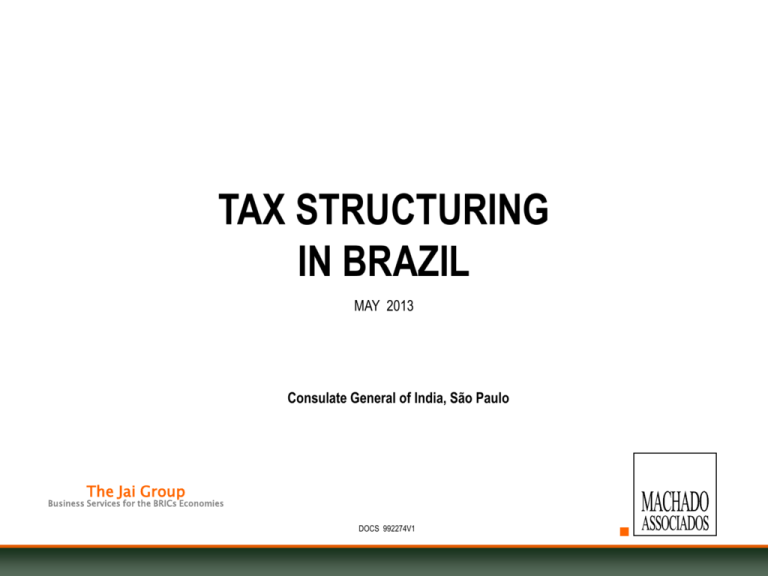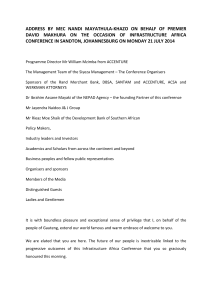The Jai Group
advertisement

The Jai Group Business Services for the BRICs Economies TAX STRUCTURING IN BRAZIL MAY 2013 Consulate General of India, São Paulo The Jai Group Business Services for the BRICs Economies DOCS 992274V1 The Jai Group Business Services for the BRICs Economies BRAZIL Overview • Brazil is a 2,395 trillion economy Sixth in the world Larger area than the continental United States Democracy and private sector capitalism One of the BRICS, relatively less affected by crisis • Growth driven by Commodity trade, Rise of a new middle class Strong Macro-economic fundamentals: fiscal surplus, trade surplus, inflation under control, lot of space to lower interest rates Upcoming sporting events and huge Oil finds, ongoing investment cycle • Problems exist, and have to be managed Taxes and Bureaucracy Corruption Market Concentration 2 The Jai Group Business Services for the BRICs Economies BRAZIL x INDIA Taxes on Profits Brazil India • Corporate Income Tax on worldwide income • Corporate Income Tax on worldwide income • Nominal rate of 34% (25% IRPJ + 10% IRPJ surcharge + 9% CSLL) Actual Profit System: net profit (-) additions and exclusions Carry forward losses: Limitation of carry forward losses to 30% of profits. Without statute of limitations • Rate of 30% + 5% surcharge + 2% Education Cess + 1% Secondary and Higher Education Cess • Dividend Distribution Tax at an effective tax rate of 16.22%1 Deemed Profit System (turnover under R$ 78 million1 in the previous year): percentage of the taxpayer's gross revenues that varies according to the activity performed (e.g. commerce and industry 8%, services 32%) Not possible to carry forward losses and to deduct expenses • No Withholding Income Tax on dividends as from 1996 3 The Jai Group BRAZIL Financing and Profit Repatriation Business Services for the BRICs Economies • Withholding Income Tax on interests: 15%/25% • Interest on net equity (Juros sobre Capital Próprio - JCP): ─ Withholding Income Tax: 15% ─ tax deductible in Brazil, provided the JCP expenses do not exceed 50% of the highest of the accumulated profits plus profit reserves of the Brazilian company; or 50% of the current profits • Thin cap rules: 2/1 – wide application including loans guaranteed by shareholder • Transfer Pricing – methods establish fixed margins (no arm’s length criteria): ― 20% if resale minus price method is used (30% for paper, glass, and chemical sectors and 40% for oil, pharmaceutical and other sectors) ― 20% mark up if cost plus method is used 4 The Jai Group Business Services for the BRICs Economies BRAZIL Taxes on the Import of Services • High tax burden imposed in Brazil, ranging from 40% to 50% on the price of the service: Withholding Income Tax: 15%/25% Contribution for the Intervention on the Economic Domain (CIDE): 10% Tax on Services (ISS): 2% to 5% Social Contributions on Revenue (PIS/COFINS-Import): 9,25% Tax on Financial Transactions (IOF): 0,38% • Broad definition of technical services • Different interpretation of the DTTs by the Brazilian tax authorities • Superior Court of Justice (STJ) - Copesul case in May 2012 – application of article 7 of the DTT to service remittances 5 The Jai Group BRAZIL Taxes on Trade - Import of Goods Business Services for the BRICs Economies • Import Tax (II) custom valuation rules variable rates from 0% to 35% • Excise Tax (IPI) applicable on importation and on the first sale within Brazil variable rates from 0% to 300% • State Value Added Tax (ICMS) similar to VAT variable rates from 17% to 39% (according to the State where the importer is based) • Social Contributions on Revenues (PIS/COFINS-Import) combined rate of normally 9.25% 6 The Jai Group Business Services for the BRICs Economies BRAZIL Taxes on Trade – Sales in Brazil • Excise Tax (IPI) similar to VAT applicable to the industrialization of products and on the first sale carried out by the importer/manufacturer variable rates from 0% to 300% • State Value Added Tax (ICMS) similar to VAT applicable on the circulation of goods, telecommunication, transportation and energy variable rates from 4% to 39% (according to the State) • Social Contributions on Revenue (PIS/COFINS) two different systems: Non cumulative: rates of 1,65% and 7,6% (credits similar to VAT) Cumulative: rates of 0,65% and 3% (with no credits) 7 The Jai Group Business Services for the BRICs Economies BRAZIL Tax Benefits • Manaus Free Zone (Zona Franca de Manaus – ZFM) - until 2023 II: up to 88% reduction on several inputs used in the manufacturing process at ZFM IPI: exemption on imports of certain inputs to be manufactured or consumed at the ZFM, on shipment of products made in Brazil to ZFM for consumption in the region and on shipment of products manufactured in ZFM to other regions within the national territory IRPJ: 75% reduction PIS and COFINS: 0% on imports from ZFM of inputs to be used in manufacturing activities within the region and certain new fixed assets; 0% on revenues from sales carried out by legal entities based outside ZFM of goods to be consumed or manufactured inside the ZFM and on revenues from sales of certain production inputs by legal entities based inside ZFM to ZFM companies; and reduced rates on sales of products manufactured by ZFM companies ICMS: exemption on shipment of national products from other Brazilian States to ZFM companies; presumed credit for the tax that would be paid if the tax exemption above were not applicable; and refunds varying from 55% to 100% of the tax due 8 The Jai Group Business Services for the BRICs Economies BRAZIL Tax Benefits • Exports fully tax exempt credit maintained in certain situations • Regional Development (North and Northeast regions – SUDAM/SUDENE) - until 2018 75% IRPJ reduction for a period of up to 10 years to activities considered of priority for the development of those regions - in certain cases an exemption can be granted • Technological Innovation Incentives Deduction of expenses with technological innovation R&D Exclusion from the IRPJ and CSLL taxable basis of percentages varying from 60% to 100% of the expenses with technological innovation R&D (conditions must be met) • Other State/Municipal and sector benefits • Port War • Fiscal War 9 The Jai Group BRAZIL Possible Advantages for Investments from India Business Services for the BRICs Economies • Double taxation Agreement Arguably reaches both Brazilian Corporate Taxes (IRPJ and CSLL) Profits taxed only in the country where the company is domiciled (save permanent establishment rules) Prohibition to tax dividends not effectively distributed Withholding taxes on dividends limited to 15% (Brazil does not tax dividends) and dividend exemption for the beneficiary of the income No withholding on dividend under Indian tax law Withholding taxes on royalties and interest limited to 15% with a 25% tax credit, however Indian domestic tax rates are more beneficial 10.55% No separate provision for fee for technical services • Tariff Preference Agreement between Mercosur and India 10 The Jai Group Business Services for the BRICs Economies BRAZIL Foreign Capital Investments • Foreign capital entering Brazil must be registered with the Central Bank of Brazil, through the Electronic Declaratory Registry (RDE) • Tax effects of the registration: the levy of Income Tax at 15% on capital gains on disposition, repatriation and liquidation of the Brazilian company by the foreign investor will probably take into account the registered amount (foreign currency or local currency controversy) • Restrictions for foreign investments oil and gas research, import and export, exploration and refining research, exploitation, enrichment, reprocessing, industrialization and trade of minerals and nuclear minerals and their by-products postal service exploitation of mines, mineral resources, and hydraulic power journalistic activities, radio and image broadcasting health assistance purchase of rural property coastal cargo navigation domestic airlines road cargo transportation, among others 11 The Jai Group Business Services for the BRICs Economies BRAZIL Corporate Structure • Branch - depends on a special permit granted by the federal government of Brazil • Subsidiary - Sociedade Limitada (Ltda – Limited Liability Company) X Sociedade Anônima (S/A Corporation) - Ltda is subject to a simple and less expensive regulatory framework: Minimum of two partners No minimum capital required Partners domiciled abroad must be represented for corporate purposes by Brazilian resident individual(s) pursuant to a power-of-attorney valid for one year at most Partners domiciled abroad must be represented for tax purposes by Brazilian resident individual(s) pursuant to a power-of-attorney 12 The Jai Group Business Services for the BRICs Economies BRAZIL Due diligence • Significant issues to analyze verify the fulfillment of the main and accessory tax obligations of federal, state and local taxes obtain tax clearance certificates in all levels of taxation identify possible labor and Social Security contingencies identify possible Competition/Antitrust contingencies/requirements review Real Estate, Intellectual Property and Environmental registrations and agreements verify legal succession risks, among other aspects 13 The Jai Group Business Services for the BRICs Economies BRAZIL Antitrust/Competition • Notification thresholds: transactions - in which the parties or their respective economic group have achieved, in the previous year, the minimum revenues in Brazil for mandatory notification (750 million reais on one side and 75 million reais on the other side) – must be submitted to merger control only if they result in acquisition of control; or they do not result in the acquisition of control, but, directly or indirectly: (a) in the case of non-competing parties: the acquired interest is equal of higher than 20 per cent of the seller’s share capital; or the purchaser already holds more than 20 per cent of the share capital of the seller and acquires an additional stake of 20 per cent or more of the seller’s capital (b) in the case of competing parties (i.e., holding horizontal relationship): the acquired interest is equal or higher than 5 per cent of the seller’s share capital; or the purchaser already holds more than 5 per cent of the share capital of the seller and acquires an additional stake of 5 per cent or more of the seller’s capital (c) in the case of an additional stake acquired by the controlling entity, the acquired interest is equal or higher than 20 per cent of the seller’s capital 14 The Jai Group BRAZIL Possible Investment Alternatives Business Services for the BRICs Economies India India Brazil India Country with India/Brazil DTTs New Company in Brazil Sales Merger Brazil Brazil Goodwill Amortization Sales 15 The Jai Group Business Services for the BRICs Economies BRAZIL Labour & Employment • Employee X Independent contractor Employee – According to the Consolidation of Labour Laws, the employee is a specific individual who is compensated for the habitual rendering of services developed under subordination to the employer; the employer has the power of directing the business and the employment relationship, and thus controlling, inspecting and sanctioning the employee; labour and employment rights and obligations prescribed by law Independent contractors – are solely responsible for their business and they do not render services under such subordination to the engaging party, as the latter just aims at the result of the contract. Independent contractors may also allocate other professionals, including their own employees and other independent contractors, to comply with their contract, which does not apply to employees; rights and obligations provisioned by the services agreement 16 The Jai Group Business Services for the BRICs Economies BRAZIL Main employee’s rights national minimum wage – BRL 678.00 Christmas bonus or 13th salary – equivalent to one-twelfth of the salary multiplied by the months of work during the year, paid in two instalments, one up to 30 November and the other up to 20 December 30 vacation days per year of work – paid with a bonus equivalent to one-third of the salary in addition to the salary of the relevant period profit or results sharing programmes if negotiated with the relevant trade union minimum prior notice period for termination by the employer – at least 30 days plus three days per year for work, limited to the maximum of 90 days, or the employer may pay it in lieu of notice overtime payment – at least 50% over the normal compensation public transportation vouchers for the employee’s journey to and from work paid by the employer, which may discount up to 6 per cent of the relevant cost from the employee’s monthly salary 120-day maternity leave with salary paid by the employer which is then reimbursed by the social security, counted from the birth or from 28 days before it other benefits may be mandatory by collective bargaining conventions or collective bargaining agreements 17 The Jai Group Business Services for the BRICs Economies BRAZIL Taxes on payroll • Employer is liable for: 20% social security contribution over the monthly salary paid to professionals Partial or total replacement of 2.5% levied on the company's gross revenues (export revenues are not included) for certain sectors: agricultural, agro-industrial, IT, call center, hospitality, road passenger transportation, some types of cargo transportation and companies engaged in the manufacturing of certain goods. This replacement is definitive for agricultural and agro-industrial sectors and temporary (until December, 2014) for the other sectors 1% to 3% social security contribution to fund work-related accident benefits and special retirement over the monthly salary, according to the activities performed by the company, that can be reduced by half or doubled according to the quantity, frequency and cost of social security benefits due to work-related accidents contributions levied at variable rates of up to 5.8% for social services provided by rural, industrial, services and trade associations 18 The Jai Group BRAZIL Taxes on payroll/Individuals Income Tax Business Services for the BRICs Economies • Employer is liable for: 8% unemployment severance fund over the monthly salary. The employer deposits this contribution into accounts opened on behalf of each employee at a governmental bank. Employees can withdraw such funds under certain circumstances, such as retirement or dismissal without cause Unfair dismissal: employer subject to a 50% fine on the FGTS balance on the termination date (40% fine reverting to the employee and 10% fine paid as a tax) • Employee: 8% to 11% social security contributions, limited to a maximum monthly contribution of BRL 457,49 (withheld by the companies) Individual Income Tax: progressive rates of up to 27.5% on worldwide income 19 The Jai Group Business Services for the BRICs Economies THANK YOU FOR PARTICIPATING! Rakesh Vaidyanathan rakesh@thejaigroup.com Luís Rogério G. Farinelli lfarinelli@machadoassociados.com.br 20





